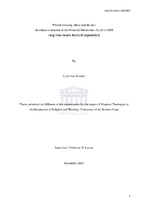Whistle blowing, ethics and the law: an ethical evaluation of the Protected Disclosures Act 26 of 2000 using Hans Jonas’s theory of responsibility
Abstract
South Africa has progressed towards the realisation of an expressive culture of disclosure. Significant implementation and enforcement of the Protected Disclosures Act (26 of 2000 – hereafter referred to as “the Act” or “the PDA”) of South Africa has assisted to enforce the practices and protections provided in terms of the enabling laws and a societal culture which is receptive to and respectful of whistle blowers. This thesis seeks to make a contribution to the discourse on whistle blowing and the PDA from an ethical perspective, by means of using ethical concepts and analysing and discussing ethical dilemmas to provide a greater understanding of the real cases of whistle blowing that has occurred. Various aspects of whistle blowing are defined and reviewed with reference to Hans Jonas’s theory of an ethics of responsibility. One such aspect is the idea of collective responsibility as understood by Hans Jonas. Hans Jonas describes responsibility; in terms of the future responsibility present individuals have as a collective in order to ensure that the future human being are able to actively engage in the world with the same familiarities as is experienced today. This thesis
will investigate, more specifically, the contribution made by Hans Jonas’s theory of
responsibility in understanding the PDA in terms of an ethics of responsibility. The research question is posed and attempts to discuss and analyse whether Hans Jonas’s theory of an ethics of responsibility may help to identify, analyse and assess ethical issues embedded in the Protected Disclosures Act 26 of 2000.

